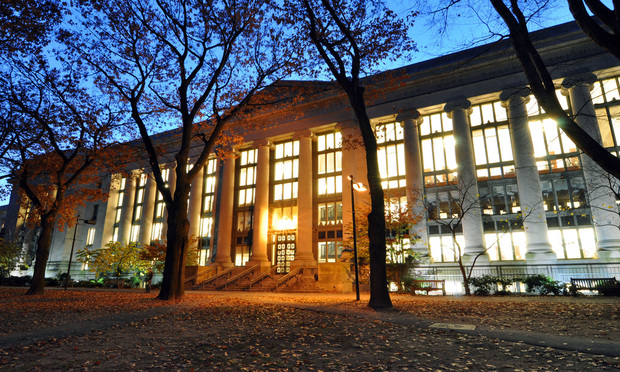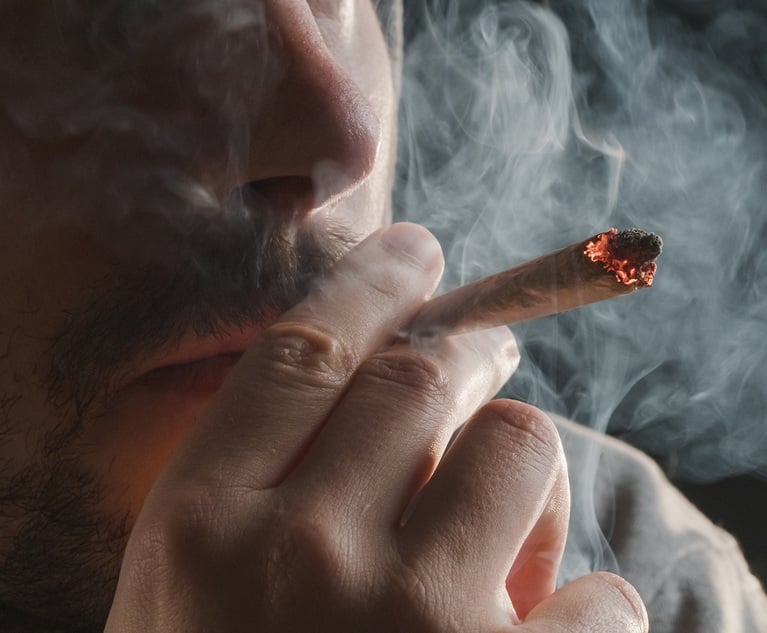Harvard Law School Rocked by Kavanaugh Turmoil
Many Harvard Law students want the school to back an investigation into U.S. Supreme Court nominee Brett Kavanaugh, who has taught there for a decade. They say the administration has been silent about their concerns.
October 01, 2018 at 03:26 PM
7 minute read
 Harvard Law School Library in Langdell Hall.
Harvard Law School Library in Langdell Hall.
Brett Kavanaugh has taught a two-week winter course at Harvard Law School since 2009, first on the separation of powers and then on the modern Supreme Court, a task for which he was paid more than $27,000 last year, according to his financial disclosure.
Harvard Law touted the presence of the latest nominee to the U.S. Supreme Court when President Donald Trump unveiled his pick in July, even supplying reams of glowing student reviews to The New York Times for an article that hailed his teaching and “great hair.”
But Harvard Law's once cozy relationship with Kavanaugh, who was hired to teach at the school back when U.S. Supreme Court Justice Elena Kagan was its dean, has turned toxic as allegations that he tried to rape a high school acquaintance in the 1980s gripped the country and injected a strong #MeToo element into his confirmation process. Kavanaugh's alma mater—Yale Law School—has garnered more attention over its ties to the nominee and for the strong student opposition to his elevation to the high court, but a similar drama is playing out 130 miles north in Cambridge.
Nearly 400 Harvard law students walked out of class last Monday in protest of Kavanaugh's nomination. And some students watching the hearings on campus Thursday applauded and cheered when Kavanaugh tearfully said Ford's claims may prevent him from teaching in the future, according to the Harvard Crimson. Many individual faculty members have been supportive of students' concerns about Kavanaugh by embracing the walkout and allowing students to watch the testimony or discuss it in class, but some students say the law school administration's response has been lacking.
“From our perspective, it feels like a failure by our administration to respond to our students first and to think about what we need to feel supported here and to feel like women are valued here,” said Molly Coleman, one of four students who wrote an op-ed in the Harvard Law Record calling for the school to investigate Kavanaugh and possibly remove him from the faculty. “We've had walkouts. We've had letters to the dean. The student body is immensely concerned about this, and to have so little response sends a strong statement that the students aren't the priority.”
Harvard students sympathetic to Christine Blasey Ford's story of attempted rape are giving their administration low marks for its handling of the fraught situation as Dean John Manning and the faculty have not collectively called for a thorough investigation of Ford's claims, as have their Yale counterparts.
“I think I'd give them a failing grade on their response,” said Katherine Peiffer, a second-year law student who is an organizer with the student-run Pipeline Parity Project. “There's a huge groundswell of activism that's going on and we're very concerned. And the law school has been silent on this. Even if Kavanaugh weren't a professor here, we would want them to speak out. But especially given the fact that he's a professor and is slated to teach a class in a couple of months, we feel like this response has been lacking.”
A law school spokeswoman did not respond on Monday to requests for comment on Kavanaugh's faculty status.
Campus discord over Kavanaugh's teaching post went public on Sept. 20 with the Harvard Law Record op-ed, which questioned whether Kavanaugh can continue to teach effectively at the institution.
“Does Harvard have a process for handling allegations of this nature, and if so, is Kavanaugh being treated as any other faculty member would be?” the op-ed reads. “Or is he exempt from these processes because of his national prestige? Is a relationship with powerful jurists more important to Harvard Law School than the concerns of its students?”
Manning did not respond publicly to the questions posed in the op-ed until Friday, when he sent an email to students assuring them that Harvard Law is looking at their concerns. (Before the email, the law school said only that it cannot comment on personnel matters.)
Manning reiterated to students that the school will not comment on Kavanaugh's status but noted that the course he is scheduled to teach in January is still several months off, allowing time for an inquiry.
“Still, I can provide you this assurance: When concerns and allegations arise about individuals in our teaching program, we take those concerns and allegations seriously, conduct necessary inquiries, complete our process, and then act,” Manning wrote.
Coleman said she was underwhelmed by Manning's response. “The letter that the dean put out feels like too little too late,” she said Monday. “We saw other elite law schools taking pretty strong stances. We saw Dean Gerken at Yale coming out solidly behind the ABA's request for an investigation. What we've seen over and over again from Harvard is basically complete silence. I don't think an email on a Friday afternoon does anything to change that.”
Peiffer, the 2L involved with the Pipeline Parity Project, called Manning's email “extremely evasive.”
Kagan hired Kavanaugh to teach at Harvard in 2009, six years after he was elevated to the U.S. Court of Appeals for the District of Columbia. (He taught at Yale and Georgetown University Law Center for one year each before becoming the Samuel Williston Lecturer on Law at Harvard.)
He initially taught separation of powers, but more recently taught a course called The Supreme Court Since 2005. The two-credit class is small, enrollment is limited to 24 students, and it focuses on Supreme Court opinions issued during the John Roberts era. It meets each day for several weeks in January, with a 20-page paper due in March.
Former students rallied around Kavanaugh before Ford's allegations becoming public. Eighty of them signed a letter to the Senate Judiciary Committee in July supporting his nomination. The signatories said they “represent a broad spectrum of political and ideological beliefs,” though the New York Times reported that some students who took Kavanaugh's class said enrollment skewed toward Federalist Society membership.
“Judge Kavanaugh was an inspiring professor and impressive intellect,” the student letter reads. “His thoughtful explanations and analysis spoke to the breadth of his legal knowledge.”
A number of Kavanaugh's former students who signed that letter did not respond to requests for comment Monday.
Following the disclosure of Ford's allegations, nearly 50 members of the Yale law faculty sent a letter to the Senate Judiciary Committee Sept. 21 asking for a delay in Kavanaugh's confirmation proceedings to allow for an investigation. Yale Dean Heather Gerken has declined to take a position on Kavanaugh's nomination, but on Friday joined the American Bar Association in calling for a thorough and fair investigation of the allegations against him.
Read more:
Law Professors, for the Most Part, Give Ford Testimony High Marks on Twitter
See the Pics: Yale Law Students Protest Kavanaugh
Yale Law Faculty Ask Senate to Pause Kavanaugh Confirmation
This content has been archived. It is available through our partners, LexisNexis® and Bloomberg Law.
To view this content, please continue to their sites.
Not a Lexis Subscriber?
Subscribe Now
Not a Bloomberg Law Subscriber?
Subscribe Now
NOT FOR REPRINT
© 2025 ALM Global, LLC, All Rights Reserved. Request academic re-use from www.copyright.com. All other uses, submit a request to [email protected]. For more information visit Asset & Logo Licensing.
You Might Like
View All
'Better of the Split': District Judge Weighs Circuit Divide in Considering Who Pays Decades-Old Medical Bill

K&L Gates Files String of Suits Against Electronics Manufacturer's Competitors, Brightness Misrepresentations
3 minute read
Ill. Class Action Claims Cannabis Companies Sell Products with Excessive THC Content
4 minute read
Plaintiffs Attorneys Awarded $113K on $1 Judgment in Noise Ordinance Dispute
4 minute readTrending Stories
Who Got The Work
J. Brugh Lower of Gibbons has entered an appearance for industrial equipment supplier Devco Corporation in a pending trademark infringement lawsuit. The suit, accusing the defendant of selling knock-off Graco products, was filed Dec. 18 in New Jersey District Court by Rivkin Radler on behalf of Graco Inc. and Graco Minnesota. The case, assigned to U.S. District Judge Zahid N. Quraishi, is 3:24-cv-11294, Graco Inc. et al v. Devco Corporation.
Who Got The Work
Rebecca Maller-Stein and Kent A. Yalowitz of Arnold & Porter Kaye Scholer have entered their appearances for Hanaco Venture Capital and its executives, Lior Prosor and David Frankel, in a pending securities lawsuit. The action, filed on Dec. 24 in New York Southern District Court by Zell, Aron & Co. on behalf of Goldeneye Advisors, accuses the defendants of negligently and fraudulently managing the plaintiff's $1 million investment. The case, assigned to U.S. District Judge Vernon S. Broderick, is 1:24-cv-09918, Goldeneye Advisors, LLC v. Hanaco Venture Capital, Ltd. et al.
Who Got The Work
Attorneys from A&O Shearman has stepped in as defense counsel for Toronto-Dominion Bank and other defendants in a pending securities class action. The suit, filed Dec. 11 in New York Southern District Court by Bleichmar Fonti & Auld, accuses the defendants of concealing the bank's 'pervasive' deficiencies in regards to its compliance with the Bank Secrecy Act and the quality of its anti-money laundering controls. The case, assigned to U.S. District Judge Arun Subramanian, is 1:24-cv-09445, Gonzalez v. The Toronto-Dominion Bank et al.
Who Got The Work
Crown Castle International, a Pennsylvania company providing shared communications infrastructure, has turned to Luke D. Wolf of Gordon Rees Scully Mansukhani to fend off a pending breach-of-contract lawsuit. The court action, filed Nov. 25 in Michigan Eastern District Court by Hooper Hathaway PC on behalf of The Town Residences LLC, accuses Crown Castle of failing to transfer approximately $30,000 in utility payments from T-Mobile in breach of a roof-top lease and assignment agreement. The case, assigned to U.S. District Judge Susan K. Declercq, is 2:24-cv-13131, The Town Residences LLC v. T-Mobile US, Inc. et al.
Who Got The Work
Wilfred P. Coronato and Daniel M. Schwartz of McCarter & English have stepped in as defense counsel to Electrolux Home Products Inc. in a pending product liability lawsuit. The court action, filed Nov. 26 in New York Eastern District Court by Poulos Lopiccolo PC and Nagel Rice LLP on behalf of David Stern, alleges that the defendant's refrigerators’ drawers and shelving repeatedly break and fall apart within months after purchase. The case, assigned to U.S. District Judge Joan M. Azrack, is 2:24-cv-08204, Stern v. Electrolux Home Products, Inc.
Featured Firms
Law Offices of Gary Martin Hays & Associates, P.C.
(470) 294-1674
Law Offices of Mark E. Salomone
(857) 444-6468
Smith & Hassler
(713) 739-1250








